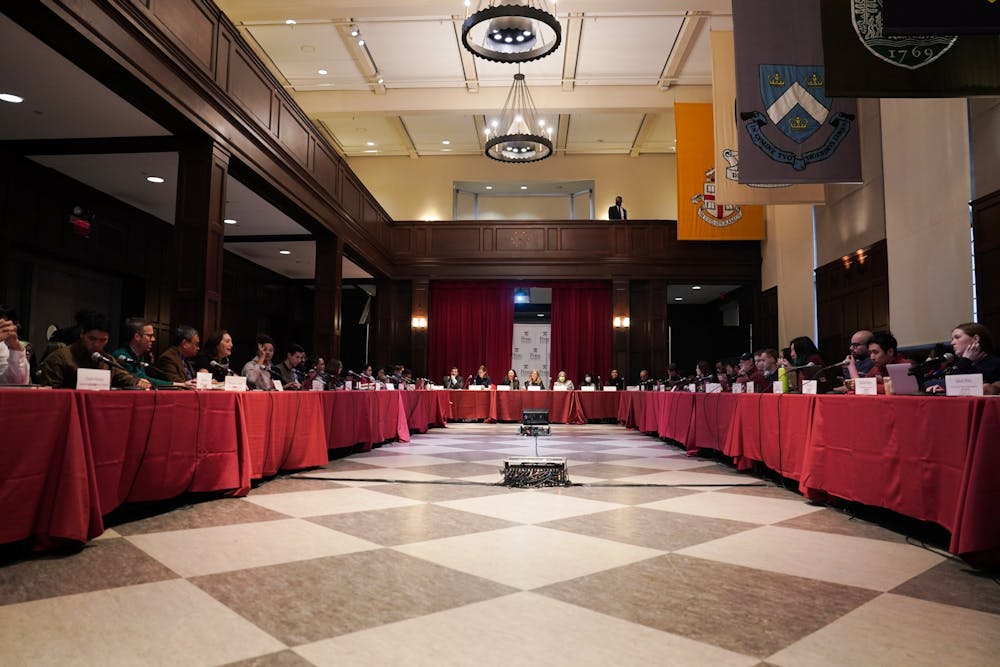
Two items on the agenda for today's University Council meeting represent an ongoing effort led by student groups to impel administrators to listen and respond to their concerns.
At the University Council meeting on March 29, the Graduate and Professional Student Assembly and the Asian Pacific Student Coalition successfully scheduled two separate presentations for the April 19 meeting focusing on graduate student financial insecurity and the development of the Philadelphia 76ers arena in Chinatown. The Undergraduate Assembly assisted APSC in scheduling their presentation, and GAPSA's presentation was added despite initial pushback from University administrators.
Previously, GAPSA failed to add its agenda item twice — at the February University Council meeting and at the subsequent University Council Steering Committee meeting in March.
During the February University Council meeting, administrators called for a quorum count on GAPSA's proposal, and GAPSA lacked quorum for the agenda item to be voted on. Later at the next Steering Committee meeting, administrators said that there was no time to include student agenda items in the March University Council meeting. GAPSA still pushed the topic to a vote, and despite both GAPSA and UA representatives voting yes, the motion did not pass. They also asked that GAPSA bring their concern to the attention of a separate University Council committee.
Despite this request, at the March University Council meeting, GAPSA made a second and successful attempt to add its agenda item to the University Council meeting agenda, this time for the April meeting.
Emily Getzen – GAPSA’s Director of Equity and Access and a fourth year Ph.D. student at the Perelman School of Medicine — said GAPSA's agenda item is important because financial insecurity is one of the largest barriers to students’ ability to attend Penn and maximize the benefits from their graduate student experience.
During GAPSA's presentation, Getzen said she wants to propose subsidized housing for graduate students and motivate administration to take action.
“If we want to have a diverse campus and a diverse graduate school, then we need to provide more financial support to people who need it,” Getzen said.
APSC took a similar step to GAPSA in March, making a successful motion to add an agenda item about the 76ers stadium proposal. College junior and UA vice president Alex Eapen said that, after witnessing the difficulty that GAPSA had in adding an agenda item, APSC worked with the Office of the University Secretary and the University Council moderator to schedule the agenda item.
“We believe that by going through this route and getting this great opportunity to talk to admin directly, we'll be able to get that conversation going,” APSC Vice Chair of Political Affairs and College sophomore Fariha Nawar said.
Overall, students that The Daily Pennsylvanian spoke with said it was complicated to have student voices heard by administration, and it is rare for students to successfully add items to the University Council agenda. Getzen expressed a desire for a more straightforward process with less barriers, while GAPSA President and third-year Penn Law School and Graduate School of Education student Robert Blake Watson said that administration should encourage students to bring up new topics beyond the provided 3-minute speeches.
Eapen said that students typically propose new topics to the chair of the University Council Steering Committee, the committee that prepares the agenda ahead of the monthly University Council meetings. At the steering meeting, the chair of the Faculty Senate puts the proposal of new topics to a vote, assuming that the agenda for the next full body meeting is not already full.
Besides the University Council Steering Committee meetings, students are allowed voice their concerns during the New Business portions of the University Council meetings — which are limited to two to three minutes and where only certain appointed organizations can speak — and during Open Forum, which occur once a semester and invite any Penn affiliate to speak. Both the New Business portion and the Open Forum do not include an opportunity for administration to respond.
According to the University Council bylaws, students, faculty, and administration are also allowed to put to a vote the addition of an agenda item, which allows them more time to speak and opens up a dialogue with administration.
“I think that what's happened over the years is that it's become more of a presentation style forum where administration presents on topics that are important to them, whereas faculty, staff, and students don’t really have the same opportunities given to them,” Watson said.
Watson added that GAPSA is hoping to continue the tradition of having students participate in University Council meetings and sustain a positive relationship with the University.
“President Magill looks forward to meeting with leaders of GAPSA along with the Interim Provost at the end of the semester, and she has also been in touch with the newly elected GAPSA leadership to share her enthusiasm about continued partnership,” University Spokesperson Ron Ozio wrote in a statement to the DP.
According to Eapen, UA helped APSC add its agenda item as part of a larger goal to have students more involved with University Council.
“The faculty tri-chairs, [UA President Carson Sheumaker], and I all share the goal of making council more involved so it’s not that you just come, sit through the presentations, and leave, but a more active discussion," Eapen said.
The Daily Pennsylvanian is an independent, student-run newspaper. Please consider making a donation to support the coverage that shapes the University. Your generosity ensures a future of strong journalism at Penn.
Donate







